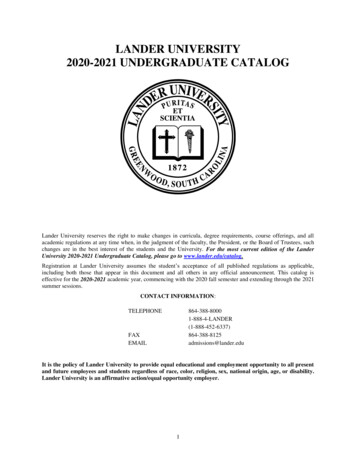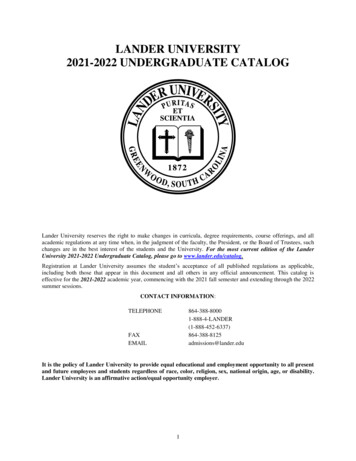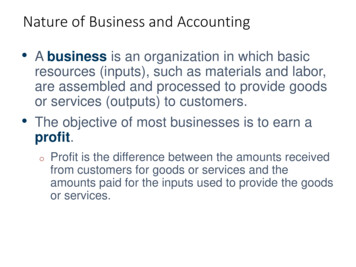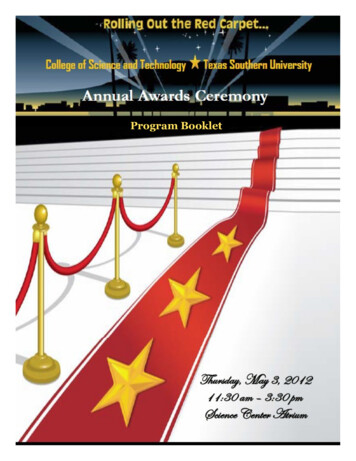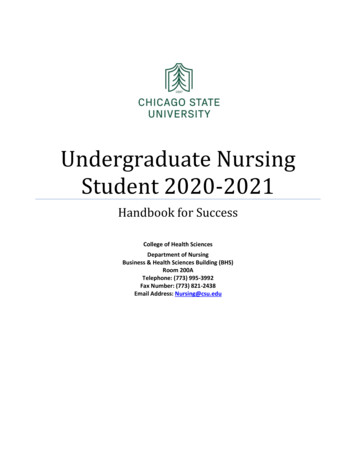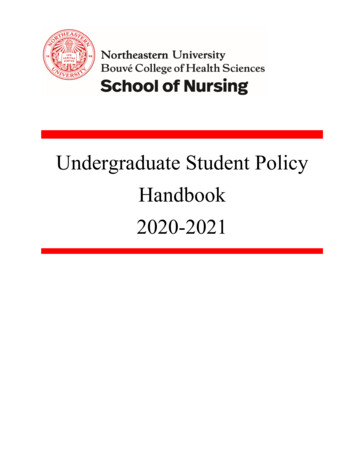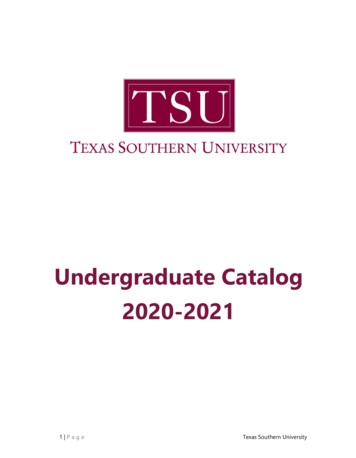
Transcription
Undergraduate Catalog2020-20211 PageTexas Southern University
2 PageTexas Southern University
ProvisionsThe provisions of this catalog do not constitute a contract, expressed or implied, between any applicant,student, or faculty member and Texas Southern University. Texas Southern University reserves the right towithdraw courses at any time and to change fees, calendars, curricula, graduation procedures, or otherrequirements affecting students. Changes will become effective whenever the proper authorities at theUniversity so determine and will apply to both prospective students and those currently enrolled. Provisionsset forth in publications of individual schools and colleges shall supersede those herein.Although every effort is made to assure that information is accurate, Texas Southern University does notassume responsibility for any misrepresentation that might arise through error in the preparation of this orany other of its catalogs or through failure to give notice of changes in its requirements, policies, tuitionand fees, course offerings and other matters affecting students or applicants. To be assured of accuracy ofinformation, students must regularly consult the University’s website, individual college requirements, up todate publications and their academic advisors.3 PageTexas Southern University
Guide to Course RSFRGEOGGEOLHEDHISTHMSCHSCRACADEMIC DISCIPLINEAccountingAfrican LanguageAfrican StudiesAir Force ScienceAdmin of JusticeArtAviation Science & TechnologyBusiness AdministrationBiologyChild & Family DevelopmentChemistryChineseCivil Engineering TechClinical Laboratory SciencesCommunication (Formerly Speech Communication)Computer Engineering TechCooperative EducationConstructionCounselingComputer ScienceClothing /TextilesDramaDrafting/Design TechnologyEconomicsEducation Admin & SupervisionEducation Curriculum& InstrEducation FoundationsHigher EducationElectronics Engr TechnologyEmergency ManagementEnglishEngineering TechnologyEntrepreneurshipEntertainment Record Indus MgmtFamily Consumer SciencesFinanceFoods & NutritionForensic ScienceFrenchGeographyGeologyHealth EducationHistoryHomeland SecurityHealth Science - Core4 GMGMTMGSCMISMKTGMSCIMTMSMUS DGREADRECRTFSCSOCSOCWSPSPANSPEDSPMTTHEAACADEMIC DISCIPLINEHuman Serv s & Consumer SciHealth Science - Envrn HlthHealth Science - Health AdminHealth Science and Health InfoHealth Science - Resp. TherpInsuranceIndustrial uringManagementManagement ScienceManagement Information SystemsMarketingMilitary ScienceMaritime Trans Mgmt SecurityApplied MusicMusicNa v al SciencesPublic AffairsPublic AdministrationPharmacy AdministrationPharmacology Applied SciencePhysical EducationPharmacyPharmaceutical ChemistryPhilosophyPharmaceutical SciencesPhysicsPolitical SciencePsychologyReading EducationReading - No Degree - DevelopmentRecreationRadio/TV/FilmCommunication Studies(Now Communication)SociologySocial WorkSpeechSpanishSpecial EducationSports ManagementTheatreTexas Southern University
Table of ContentsProvisionsiiiTable of Contents5Guide to Course OfferingsUndergraduate Degreesiv9About This Bulletin11About the University17University Academic Program DefinitionsMission1217Vision17Organization for Instruction18Campuses18Regents and AdministrationPolicies and Accreditation1921Notice of Nondiscriminatory Policies21Campus Carry Policy21University Commitment and Student Responsibilities22Accredited ProgramsAdmission Requirements, Enrollment Information, and Academic Regulations2324International Student Admissions26Transfer Credit31Academic Fresh Start33Academic Regulations37Drop Policy41The Office of Information Technology (OIT)TSU OnlineTSU General Education Core Curriculum535558TSU Core Curriculum Objectives59TSU General Education Core Curriculum Courses62Graduation Requirements64Undergraduate Minors72University Majors5 Page68Texas Southern University
University Concentrations75Fees and Expenses81Types of Financial Aid and Assistance89FERPATuition and FeesResidential Life and Housing ProceduresStudent Services and Campus LifeStudent Life788498100100Counseling Services101Student Health Services102Trio Student Support Services Program103University Career and Professional Development Center104Office of Veteran Services105Substance Abuse Prevention, Education and Intervention Program (SAPEI)107Student Accessibility Services Office (SASO)107Americans With Disabilities Act (ADA)/Section 504 Policy109Procedures for Requesting Accommodations113Office of Continuing Education118University Testing Services119Statement of Ethical Principles121Title IX Grievance Procedures121Jesse H. Jones School of Business132Department of Accounting and Finance136Department of Business Administration153School of Communication177Department of Communication Studies181Department of Journalism191Department of Radio, Television and Film (RTF), and Entertainment & Recording Industry Management(ERM)204College of EducationCollege of Education Clinical PracticeDepartment of Curriculum and Instruction6 Page225229231Texas Southern University
Department of Health, Kinesiology and Sport Studies269College of Liberal Arts and Behavioral Sciences343Department of English and Foreign Languages346Department of History, Geography & General Studies378Department of Music428Department of Psychology463Department of Social Work473Department of Sociology484Department of Visual and Performing Arts497Barbara Jordan – Mickey Leland School of Public Affairs532Department of Administration of Justice537Department of Political Science554College of Pharmacy and Health Sciences575Pharmaceutical and Environmental Health Sciences588Department of Pharmacy Administration and Administrative Health Sciences602Department of Pharmacy Practice and Clinical Health Sciences620College of Science, Engineering and TechnologyDepartment of Biology661669Department of Chemistry697Department of Computer Science715Department of Engineering742Department of Environmental and Interdisciplinary Sciences793Department of Industrial Technologies794Department of Mathematics819Department of Physics843Department of Transportation Studies859Thomas F. Freeman Honors College7 Page897Texas Southern University
Schools and Colleges Jesse H. Jones School of Businesso oDepartment of Business AdministrationoDepartment of Communication StudiesoDepartment of Radio, Television, and FilmSchool of Communicationo College of Education Clinical Practiceo Educator Preparation ProgramDepartment of Curriculum and InstructionoDepartment of Health, Kinesiology and Sport StudiesoDepartment of EnglishoDepartment of History and GeographyoDepartment of MusicoDepartment of Social WorkoDepartment of Visual and Performing ArtsoDepartment of Administration of JusticeCollege of Liberal Arts and Behavioral SciencesoDepartment of Foreign LanguagesoDepartment of Human Services and Consumer SciencesoDepartment of PsychologyoDepartment of SociologyBarbara Jordan – Mickey Leland School of Public AffairsoDepartment of Political ScienceoDepartment of Pharmaceutical and Environmental Health SciencesoDepartment of Pharmacy Practice and Clinical Health SciencesoDepartment of Aviation Science and TechnologyoDepartment of ChemistryoDepartment of EngineeringoDepartment of Industrial TechnologiesoDepartment of PhysicsCollege of Pharmacy and Health Scienceso Department of JournalismCollege of Educationo Department of Accounting and FinanceDepartment of Pharmacy Administration and Administrative Health SciencesCollege of Science, Engineering and TechnologyoDepartment of BiologyoDepartment of Computer ScienceoDepartment of Environmental and Interdisciplinary SciencesoDepartment of MathematicsoDepartment of Transportation StudiesThomas F. Freeman Honors College8 PageTexas Southern University
Undergraduate DegreesCOLLEGE ORSCHOOLJesse H. JonesSchool ofBusinessSchool ofCommunicationDEPARTMENTUNDERGRADUATE DEGREES OFFEREDAccountingBachelor of Business Administration (B.B.A.) in AccountingAccounting andFinanceBusinessAdministrationBachelor of Business Administration (B.B.A.) in ManagementBachelor of Business Administration (B.B.A.) in Management InformationSystemsBachelor of Business Administration (B.B.A.) in MarketingCommunicationStudiesBachelor of Arts (B.A.) in Entertainment and the Recording IndustryJournalismBachelor of Arts (B.A.) in JournalismRadio, TV and FilmBachelor of Arts (B.A.) in Radio, TV and FilmCurriculum andInstructionCollege ofEducationBachelor of Business Administration (B.B.A.) in FinanceHealth, Kinesiologyand Sport StudiesBachelor of Arts (B.A.) in Communication StudiesBachelor of Science (B.S.) in Interdisciplinary StudiesBachelor of Science (B.S.) in Health StudiesBachelor of Science (B.S.) in KinesiologyBachelor of Science (B.S.) in Athletic TrainingBachelor of Science (B.S.) in Sport ManagementCollege ofLiberal Arts andBehavioralSciencesEnglishBachelor of Arts (B.A.) in EnglishForeign LanguagesBachelor of Arts (B.A.) in SpanishHistory andGeographyBachelor of Arts (B.A.) in General StudiesHuman Services andConsumer SciencesMusicBarbara JordanMickey LelandSchool of PublicAffairs9 PageBachelor of Arts (B.A.) in HistoryBachelor of Science (B.S.) in Human Services and Consumer Sciences DieteticsBachelor of Science (B.S.) in Human Services and Consumer Sciences –Child and Family DevelopmentBachelor of Science (B.S.) in Human Services and Consumer Sciences –Family and Consumer ScienceBachelor of Science (B.S.) in Human Services and Consumer Sciences –Food and NutritionBachelor of Arts (B.A.) in MusicPsychologyBachelor of Arts (B.A.) in PsychologySocial WorkBachelor of Arts (B.A.) in Social WorkSociologyBachelor of Arts (B.A.) in SociologyVisual and PerformingArtsBachelor of Arts (B.A.) in ArtBachelor of Arts (B.A.) in TheatreBachelor of Arts (B.A.) in Political SciencePolitical ScienceBachelor of Science (B.S.) in Public AffairsAdministration ofJusticeBachelor of Science (B.S.) in Administration of JusticeBachelor of Science (B.S.) in Emergency Management and HomelandSecurityBachelor of Science (B.S.) in Health AdministrationTexas Southern University
COLLEGE ORSCHOOLCollege ofPharmacy andHealth SciencesDEPARTMENTPharmacyAdministration andAdministrative HealthSciencesPharmaceutical andEnvironmental HealthSciencesPharmacy Practice andClinical HealthSciencesAviation Science andTechnologyBiologyUNDERGRADUATE DEGREES OFFEREDBachelor of Science (B.S.) in Health Information ManagementBachelor of Science (B.S.) in Environmental HealthBachelor of Science (B.S.) in Respiratory TherapyBachelor of Science (B.S.) in Clinical Laboratory ScienceBachelor of Science (B.S.) in Aviation Science ManagementBachelor of Science (B.S.) in Aviation Science Management (ProfessionalPilot Concentration)Bachelor of Science (B.S.) in BiologyChemistryBachelor of Science (B.S.) in ChemistryComputer ScienceBachelor of Science (B.S.) in Computer ScienceBachelor of Science (B.S.) in Civil EngineeringCollege ofScience,Engineering andTechnologyBachelor of Science (B.S.) in Electrical and ComputerEngineeringBachelor of Science (B.S.) in Civil Engineering TechnologyBachelor of Science (B.S.) in Computer Engineering TechnologyBachelor of Science (B.S.) in Electronics Engineering TechnologyIndustrial TechnologyBachelor of Science (B.S.) in Industrial Technology (ConstructionTechnology)MathematicsBachelor of Science (B.S.) in MathematicsPhysicsBachelor of Science (B.S) in Physics (Engineering-Physics Concentration)Texas PhysicsConsortiumTransportation StudiesBachelor of Science (B.S.) in Industrial Technology (Design Technology)Bachelor of Science (B.S) in Physics (Premedical-Physics Concentration)Bachelor of Science (B.S.) in Maritime Transportation Management andSecurityNOTE: Many of the degrees offered have multiple tracks leading toward their completion. Consult contentsof this bulletin related to the various departments and the respective degrees offered for detailedinformation on these tracks. Texas Southern University does not offer an undergraduate degree in nursing;however, students interested in pursuing this degree elsewhere may earn lower level credits needed for thisdegree at the University. The Department of Biology administers a pre-nursing program, and studentschoosing to pursue this course of study should consult that department’s section of this bulletin for moreinformation.10 P a g eTexas Southern University
About This BulletinThis undergraduate bulletin contains information on academic and non-academic policies, procedures, andrequirements with which each student must become familiar. Students should consult the Table of Contentsfor guidance. Provisions in this bulletin will not be valid after August 2021. The statements set forth in thisbulletin are for informational purposes only and should not be construed as the basis of a contract betweena student and Texas Southern University. Provisions set forth in publications of individual schools andcolleges shall supersede those herein.Although the provisions of this bulletin will ordinarily be applied as stated, Texas Southern Universityreserves the right to change any provision listed in this bulletin, including but not limited to academicrequirements for graduation, without actual notice to individual students. However, every effort will bemade to keep students advised of any such changes. Information concerning changes in policies,procedures, and requirements will be available in the Office of the University Registrar and the offices of thevarious academic advisors, the academic departments, and the major schools and colleges. It is especiallyimportant that each student note that it is his or her responsibility to be aware of current graduationrequirements for a particular degree program.The provisions of this catalog do not constitute a contract, expressed or implied, between any applicant,student, or faculty member and Texas Southern University. Texas Southern University reserves the right towithdraw courses at any time and to change fees, calendars, curricula, graduation procedures, or otherrequirements affecting students. Changes will become effective whenever the proper authorities at theUniversity so determine and will apply to both prospective students and those currently enrolled. Provisionsset forth in publications of individual schools and colleges shall supersede those herein.Although every effort is made to assure that information is accurate, Texas Southern University does notassume responsibility for any misrepresentation that might arise through error in the preparation of this orany other of its catalogs or through failure to give notice of changes in its requirements, policies, tuitionand fees, course offerings and other matters affecting students or applicants. To be assured of accuracy ofinformation, students must regularly consult current publications and academic advisors.11 P a g eTexas Southern University
University Academic Program DefinitionsFor the purpose of planning, the definition of an academic year, as provided by the U.S. Department ofEducation, has been used. This definition follows: An academic year is a period that begins on the first day of classes and ends on the last day ofclasses or examinations, and, that is a minimum of 30 weeks of instructional time. For purposes of the definition of an academic year, a week is a consecutive 7-day period.For an educational program using a semester, trimester, or quarter system or clock hours, theSecretary considers a week of instructional time to be any week in which at least one day ofregularly scheduled instruction, examinations, or preparation for examination occurs. For an educational program using credit hours (but not using a semester, trimester, or quartersystem), the Secretary considers a week of instruction to be 5 days. Instruction time does not include periods of orientation, counseling, vacation, or other activity notrelated to class preparation or examinations.CourseA course is a unique combination of title, course number, credit hours, and other course attributes that mayinclude terms offered, cross listed courses, contact hours, pre- or co-requisites, credit type, level.Academic ProgramAn academic program is defined as any combination of courses and/or requirements leading to a degree orcertificate.Executive ProgramsAn executive program refers to academic programs at the graduate-level designed for executives, businessleaders and functional managers. These programs are offered as online programs.Accelerated ProgramDesignated programs arranged between undergraduate and graduate or professional schools and colleges.Students apply separately to and must be accepted by both programs. The curricula of dual degreeprograms are not integrated. Students complete all curricular requirements of each program. The programsmay allow special coordination of scheduling or allocation of electives. Upon successful completion of eachcomponent of the dual program, the students will receive the degree specific to that component, (ex. B.S. /M.S. (4 1))12 P a g eTexas Southern University
DegreeA title that the University confers on a student who has satisfactorily completed a required program ofstudy. Degree requirements are established by the university, colleges, and departments, and are approved New degrees must be approved by the university administration, the TSU Board of Regents, and thethrough the curriculum approval process.Texas Higher Education Coordinating Board (THECB).MajorA major represents the primary field of study for a degree-seeking student. It is a structured plan of studythat is part of a degree plan and must have a minimum of 30 semester credit hours. A completed major is shown on the diploma and the transcript.A new major must go through the curriculum approval process. In addition, new majors must beapproved by the university administration, the TSU Board of Regents, and the Texas HigherEducation Coordinating Board.Changes to an existing major must be accomplished in accordance with TSU’s curriculum updateprocess.Every major will have a Classification of Instructional Programs (CIP) code attached to it.Only formally approved majors will appear in the University Catalog.MinorA minor represents an optional, secondary field of study for a degree-seeking student. It is a structuredplan of study requiring a minimum of 18 semester hours and no more than 21 semester hours. Every minor will have a Classification of Instructional Programs (CIP) code attached to it. New minors as well as changes to existing minors must go through the curriculum approval process. Only approved minors will appear in the University Catalog. Minors will be printed on the student transcript.ConcentrationA concentration is an approved set of courses within a major that defines a specialty area or specific field ofstudy. Unless specified by the unit offering the major, a concentration is not required. The term concentration will be used to describe what used to be called degree track, emphasis, Every concentration will have a Classification of Instructional Programs (CIP) code attached to it. specialty/ specialized area, and option.Both new concentrations and changes to existing concentrations must go through the curriculumapproval process.Only formally approved concentrations will appear in the University Catalog.Concentrations will be printed on the diploma and the transcript.13 P a g eTexas Southern University
Differences Between a Concentration and a MinorThe ultimate difference between a concentration and a minor is that a concentration is very specificacademic subfield within the major, but a minor is a separate field of study.Ac
information on these tracks. Texas Southern University does not offer an undergraduate degree in nursing; however, students interested in pursuing this degree elsewhere may earn lower level credits needed for this degree at the University. The Department of Biology administers a pre-nursing
